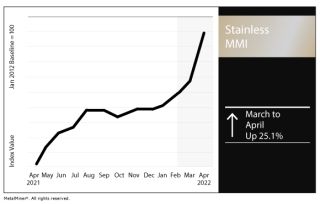News
 Have you heard about the price of stainless? A year ago, I advised a customer, “Stainless is the new lumber.” At the time, the market for wood was sky high and headed north. People couldn’t build fast enough, couldn’t find material, couldn’t ship material, couldn’t harvest enough trees to keep us supplied with toilet paper, let alone pallets.
Have you heard about the price of stainless? A year ago, I advised a customer, “Stainless is the new lumber.” At the time, the market for wood was sky high and headed north. People couldn’t build fast enough, couldn’t find material, couldn’t ship material, couldn’t harvest enough trees to keep us supplied with toilet paper, let alone pallets.
Since then, you have noticed the price of gas has gone up. And you may have heard that used trucks are demanding a premium. And new trucks. And eggs. Milk. Homes. Taxes. Everything but wages.
Stainless steel will not be outdone. March saw a 90% spike in nickel price, with an April increase of an additional 25% on its heels. Nickel is the added element that makes steel stainless. So if you watch nickel prices, you’re watching the stainless price.
 The Making Kansas Bus Tour made a stop in Topeka to hear about the state of the manufacturing industry. Curtis Sneden and Joe Pennington wowed the group of industry leaders and advocates from across the state. The monthlong event, sponsored by the Kansas Manufacturing Council, highlights the state’s manufacturing industry and career opportunities.
The Making Kansas Bus Tour made a stop in Topeka to hear about the state of the manufacturing industry. Curtis Sneden and Joe Pennington wowed the group of industry leaders and advocates from across the state. The monthlong event, sponsored by the Kansas Manufacturing Council, highlights the state’s manufacturing industry and career opportunities.
Mr. Sneden, president of the Greater Topeka Chamber of Commerce, said “Although the capital city is correctly regarded as a government hub, the manufacturing sector is poised to take over as an economic engine.” He shared information showing 12,000 people in Shawnee County work in public administration, while 11,500 have jobs in manufacturing and distribution.
Pretzels, Inc. ha s announced plans to construct a state-of-the-art production facility in Lawrence, Kansas. The new 150,000-square-foot facility will create a significant number of new jobs and increase the company's capacity across a range of products. It is expected to be operational in late 2021.
s announced plans to construct a state-of-the-art production facility in Lawrence, Kansas. The new 150,000-square-foot facility will create a significant number of new jobs and increase the company's capacity across a range of products. It is expected to be operational in late 2021.
Chris Gutierrez of the Kansas City Area Development Council touts the region to potential employers. “We are marketing KC as the snack capitol of the world,” he said. “The area offers a multitude of advantages for manufacturers: Proximity of raw materials, distribution efficiency, and a heartland work ethic.”
Pretzels, Inc. joins powerhouses PepsiCo and Dot’s Pretzels in the KC area.

Joe Pennington, president of Stevenson Company in Topeka, recently joined the Board of Advisors. “The Kansas Manufacturing Council is providing support, knowledge, and resources for the manufacturing industry. The voices of innovation and jobs creation should be heard and disseminated. I’m excited to listen, learn, and advocate where I can,” said Pennington.
Pennington is looking forward to visiting Kansas manufacturers during a “Making Kansas” bus tour. “Even after thirty years in the industry, I still feel like a kid at a Wonka factory when I visit these facilities,” he said. “People would be amazed and surprised at the commitment to technology, innovation, and environment going on here.” The bus tour will kick off in September, stopping in shops statewide to spotlight the impact enterprises are making to communities and the economy.
Stevenson Compa ny, Inc. is pleased to announce that Jason Huston has been promoted to Project Manager to the delight of an expanding clientele.
ny, Inc. is pleased to announce that Jason Huston has been promoted to Project Manager to the delight of an expanding clientele.
“Jason stood out among the candidates due to his experience, his reputation as a man of integrity, and his demonstrated ability to connect with customers,” Stevenson president Joe Pennington said. “I am especially impressed with Jason’s vision for the success of our food manufacturing partners. Jason understands the critical issues of food safety, allocation of resources, and minimizing downtime inside plants. He is well-equipped to help customers increase consumer confidence and grow profitability.”
